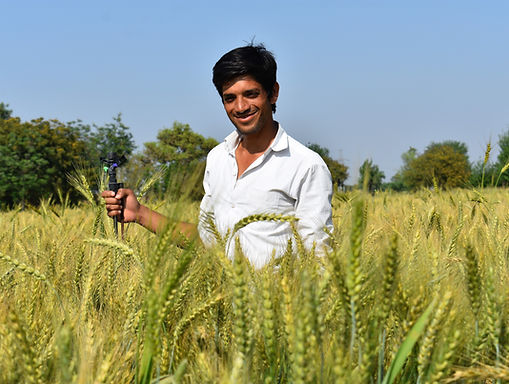Surinder M. Sehgal
Founder of Sehgal Foundation
.png)
Surinder M. Sehgal (Suri) was born in a part of India that became Pakistan during the Partition in 1947. His father, a businessman and community organizer, worked alongside Mahatma Gandhi for India's independence. Suri’s family fled as refugees when he was thirteen.
Edda Jeglinsky Sehgal
Founder of Sehgal Foundation
.png)
Edda Jeglinsky Sehgal was only three years old when World War II ended, and her family fled their home in the Silesian lowlands (now Poland). Both families rebuilt their lives—Suri’s in Amritsar, India, and Edda’s in Göppingen, Germany.

A Life of Service and Science
Suri came to the US in 1959 to study plant genetics at Harvard University in Boston where he met Edda who was learning English as an au pair in the home of a Harvard professor. After earning his PhD, Suri joined Pioneer Seed Company in Des Moines, Iowa. He and Edda married, raised four children, and built a successful international career in hybrid seed development, working to provide affordable, high-quality seeds to poor farmers worldwide. Suri and Edda worked together in several successful seed business ventures.
A Shared Vision
In 1998, after the lucrative sale of their seed company, Proagro, Suri and Edda decided to use the bulk of their wealth to give back to Suri’s country of origin in gratitude for all that India had done to prepare him for success in life. The first step was to incorporate Sehgal Foundation in the US in 1998 with the purpose of promoting sustainable agriculture, plant biodiversity and genetic resources, environmental protection, and women’s literacy. They created S M Sehgal Foundation (SMSF) in India in 1999 to develop and test innovative rural development models for the benefit of the millions of small-scale farmers in India’s often-neglected villages.
_JPG.jpg)

Addressing a Water Crisis
Water management is a core focus for interventions in rural villages. SMSF teams work with communities to harvest and store rainwater for direct use; replenish groundwater by building and restoring infrastructure in villages; support the revival of traditional water bodies and storage infrastructures; and promote safe disposal of wastewater. SMSF promotes safe drinking water with innovative low-cost, sustainable technologies and WASH (water, sanitation, and health) behaviors, and awareness about the need for water
conservation. With a goal of building the capacities of local communities for better management and long-term sustainability of their water resources, SMSF seeks opportunities to collaborate
for continuous improvement and replication of low-cost water management interventions.
Capacity building for Farmers’ Sustainable Livelihoods
Emphasis on capacity building for farmers is fully inclusive of women farmers, and involves improvements in agricultural practices, and promoting new technologies that increase crop yields, conserve water, and improve soil fertility. The Agriculture Development team work with small-holder and marginal farmers in rain-fed and irrigated areas to facilitate adoption of advanced and sustainable agricultural practices that include soil health management, climate-smart interventions, crop production management, input-use efficiency, small farm mechanization, water-efficient irrigation techniques, horticultural development, livestock management, kitchen gardens, and the use of information and communication technology in agriculture.


Empowering the Next Generation
The Transform Lives one school at a time program provides schoolchildren with access to drinking water, better sanitation facilities, a learning-conducive school environment, and digital
literacy and life skills awareness trainings. Parents, teachers, and children are encouraged to increase enrollment and reduce dropouts in rural government schools, especially for girl children. School Management Committees (SMCs) are provided with support and training to build their capacities for improved and sustained functioning of the school.
Digital literacy and Life Skills Awareness trainings for youth and women focus on bridging the urban/rural divide, helping to develop social and emotional skills and increase knowledge of government programs and their own role in the development of their village.

With support from corporate, government, academic, and individual donors, SMSF has made groundbreaking progress in rural India, receiving local, national, and international recognition. With more than a quarter century of experience, SMSF continues expanding its programs across India, bringing lasting change to the most vulnerable communities.
